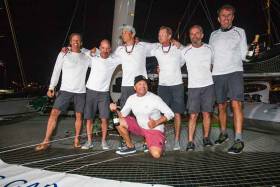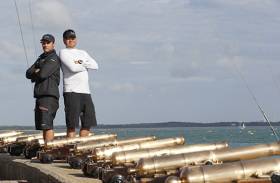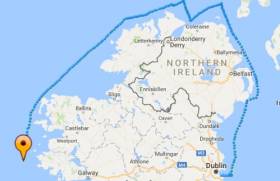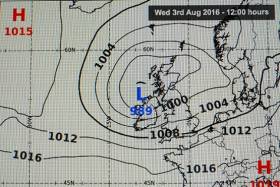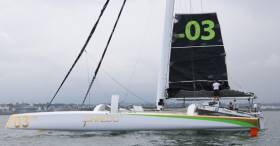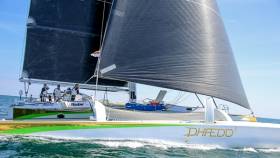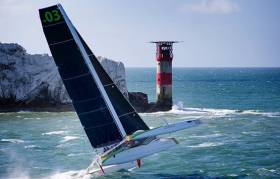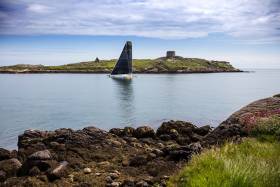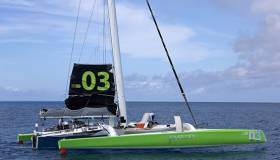Displaying items by tag: Phaedo3
Damian Foxall & Phaedo 3 Finish RORC Caribbean 600 in 33 Hours
After an epic battle with their MOD70 sister ship Maserati, Phaedo^3 with County Kerry's Damian Foxall onboard took multihull line honours in the RORC Caribbean 600.
The Round Ireland speed record holder Lloyd Thornburg and his crew of Brian Thompson, Michel Desjoyeaux, Miles Seddon, Rob Greenhalgh, Pete Cumming, Paul Allen and Foxall, finished with an elasped time of 33 hours 40 minutes and 46 seconds. The clubhouse leaders have to wait until the rest of the MORCA fleet finish to see how they finish on handicap.
Last night, National Yacht Club Commodore Larry Power presented American yachtsman Llyod Thornburg and the crew of Phaedo 3, with the Cork Dry Gin Round Ireland Record Perpetual trophy for August's record breaking run. A dinner to celebrate the new Round Ireland Speed Record followed at the Dun Laoghaire clubhouse. Irish World Speed Sailing Commissioner Chris Moore attended.
Thornburg set the new record in his 70–foot trimaran Phaedo 3 just a month after a new record was made by rival MOD 70 Oman Sail. Phaedo 3 crossed the Kish lighthouse start/finish line at Dún Laoghaire, at 04.01.04am on Friday, 5th August 2016, beating the previous world record by approximately 1 hours and 45 minutes.
The 36 hours and 52 minutes time was later ratified by the World Speed Sailing Record Council.
All crew members who were onboard for the world record run attended last night's dinner, including County Kerry's Damian Foxall.
Round Ireland Speed Record Breaker Phaedo3 Takes Line Honours In Tenth Artemis Challenge
Round Ireland speed sailing record breaker Phaedo3 skipper Lloyd Thornburg, who will be at the National Yacht Club tonight to celebrate that circumnavigation, picked up another prize yesterday when the American took line honours in the tenth edition of the Artemis Challenge at Aberdeen Asset Management Cowes Week.
Screaming around the Isle of Wight at top speeds of over 30 knots, Thornburg's MOD70 covered the 50 nautical mile course in three hours and 56 seconds, 50 minutes ahead of M32 Tranwall.
Powering over the Royal Yacht Squadron start line in a flash of gold and white, Phaedo3 flew past the Needles at 27 knots. Executing just three tacks the along the north west coast past Yarmouth, the boat was on pace with the world record holder Foncia.
Despite their rapid speed and sheer determination, light conditions on the south east side of the Island put paid to any record breaking runs, with the current world record set by Michel Desjoyeaux and Foncia in the 2012 edition of the race out of reach at two hours, 21 minutes and 25 seconds.
Despite the sheer size of Phaedo3, M32 Tranwall was hot on the stern of the MOD70. On the approach to Saint Catherine's lighthouse, the 32-foot match-racing catamaran achieved speeds of 21 knots and was just five miles behind the ocean racing giant - not bad for a catamaran measuring in at less than half the size of the giant trimaran's hulls.
In what was the first time an M32 has competed in the Artemis Challenge, the Tranwall crew set their own benchmark today, completing the charity sprint in three hours, 58 minutes and one second.
Phaedo Approaches Halfway Stage In Round Ireland Speed Challenge
Lloyd Thornburg’s MOD 70 was past Achill Island in Mayo this morning by 0700 in her anti-clockwise Round Ireland record attempt, which began at Dublin Bay Bay’s Kish Lighthouse at 3.0 pm yesterday afternoon writes W M Nixon. But though she had more wind than she needed for much of yesterday, the sting has gone out of the westerly breeze off the Connacht, coast and off Clew Bay at 0710 hrs she was doing a relatively modest 15.1 knots on track southward. See tracker here.
With the fresh winds veering towards west to nor’west as she came onto the north coast, as expected Phaedo had to beat from Torr Head to Malin Head. But with her enormous speed potential, it was an advantage that the tide was flooding adversely southeast into the North Channel, as it this eliminated the area’s Maelstrom-like conditions when it’s wind over tide, and the boat’s extraordinary speed enabled her to offset strong adverse tidal stream.
Phaedo showed her quality by taking just four hours and forty minutes to beat from Torr Head (where she was making 19.3 nots) to Malin Head, and with Malin finally astern at 00.40 hrs this (Thursday) morning, she was finally able to lay the course past Tory Island and then free still further for potentially faster progress towards the northwest headlands of Mayo.
But with the sea state somewhat confused after two days of strong winds, and the bite in the nor’west and then westerly breeze sometimes weakening, she hasn’t always been at her full speed potential. Though she was at 25.7 knots approaching Achill Head at 0640 this morning, once past it the pace slackened for a while, but now at 07.35 things are looking up again, and she’s making 29.1 knots
If we’re going to have this abominable weather for the first week of August on the fronts and backs of the weaving Jetstream, then somebody might as well do something useful with it writes W M Nixon. So here’s cheers to Lloyd Thornburg and his crew on the MOD 70 Phaedo 3 as they gather themselves in Dun Laoghaire to rocket out to the Kish Lighthouse and get timed on their way by NYC Commodore Larry Power for yet another tilt at the magnificent challenge of the Round Ireland Record. Tracker here
Time is of the essence, for as the noon pressure map shows, a low of 989 (already up from its lowest of 987) is currently tightly bunched at Tory Island, giving favourable winds northward through the Irish Sea and North Channel. But as the low continues to march eastward off Ireland’s north coast, it’s going to continue losing the depths of its central pressure – albeit slowly - the isobars will start to spread, and what had been strong winds can become messy stuff all over the place surprisingly quickly.
Assuming they’re going anti-clockwise, the idea is to reduce the tricky bit on the North Coast from Rathlin Island to Malin Head to as quick a sail as possible, as there’ll be more favourable nor’westers beyond Malin for a while.
It should be remembered that a lot of time was lost during the clockwise Volvo Round Ireland Race on the south coast with the long board taken seaward in search of stronger winds, and to make windward progress down to the Fastnet in the earlier southwest wind.
As a result, the three MOD 70s sailed 790 miles to cover the 704 mile course. Yet despite that they chopped a clear two hours off the record to bring it down to 38 hours 37 minutes. So a time of 30 hours – okay, let’s say 33 – is theoretically possible.
Lloyd Thornburg has a crew of all the talents, as he has Brian Thompson who set the beautiful Lakota record with Steve Fossett in 1993, and he also has Damian Foxall who was on Oman Sail when she set the new record at the finish line of the Volvo Round Ireland Race on June 20th.
But Foxall was also on Oman when she flipped during the Quebec Transatlantic race to France on July 17th, so he knows only too well how much on the edge you are with these boats when pushing to the limit, and this will be a continuous theme if this challenge is going to be a success.
The seas are tide-riven and turbulent the whole way from the South Rock at the south end of the North Channel on past Rathlin, continuing potentially rough to very rough until you’re well beyond Malin Head.
And then out there in the open Atlantic, even if you do catch a useful amount of the strong north’westers on the back of the low, you’ll find the strong to gale force sou’westers of the past couple of days have provided a leftover head sea which may never completely disappear, for after a while it is presaging the next lot of bad weather coming in from mid-Atlantic.
It’s a complex and fast-changing meteorological scene out there. But the message from this weather map at noon Wednesday seems to be that they should be on their way northward from Dublin Bay right now
Round Ireland Speed Record Attempt Is Go!
Lloyd Thornburg's trimaran Phaedo 3 will make another attempt at the Round Ireland Speed Record tomorrow. Westerly winds are expected to reach 40–knots tomorrow giving ideal conditions for the 50–mph craft.
News of the bid that has been circulating for some time was confirmed tonight by the World Speed Sailing Commissioner Chris Moore of the National Yacht Club.
The Round Ireland Speed record was broken in style in June by the Oman Sail MOD70 that subsequently capsized this month on a Transatlantic record bid.
Sidney Gavignet's Musandam-Oman Sail set an historic new record for the fastest-ever sail Round Ireland when he crossed the Volvo Round Ireland Race finish line at Wicklow in June in just 38 hours, 37 minutes and 7 seconds smashing their own 2015 record by an incredible 2 hours, 14 minutes and 50 seconds.
Tomorrow's record run in the American MOD 70 trimaran is understood to include Damian Foxall as a crew member. Foxall, from County Kerry was aboard Omansail for the June record and also when Oman sail capsized this month.
The run will start sometime between noon and 9pm from Dublin Bay tomorrow. The start line will be a line from the east pier to the Kish lighthouse.
Another Round Ireland Speed Record Bid?
There are unconfirmed reports that the MOD70 Trimaran Phaedo3 will make a further bid at the Round Ireland Speed Record this month. The MOD70 skippered by American Lloyd Thornburg is understood to be considering a return to Ireland to make a further bid on the 700–mile record time set by Oman Sail during last month's Round Ireland Race. In a thrilling three way duel Thornburg's crew were edged out of the honours in an Irish Sea battle on June 20th.
The historic new record for the fastest-ever sail round Ireland was set when Oman Sail crossed the Volvo Round Ireland Race finish line at Wicklow on June 20th in just 38 hours, 37 minutes and 7 seconds, smashing their own 2015 record by an incredible 2 hours, 14 minutes and 50 seconds. The new time is subject to ratification by the World Speed Sailing Record Council.
Earlier this month, Phaedo 3 set a new record round the Isle of Wight. Omansail capsized at the weekend while her crew were attempting to set a new transatlantic record.
Round The Island Record Broken By Phaedo 3
This year's J.P. Morgan Asset Management Round the Island will go down in history as a windy edition of the event. Having shattered the multihull race record in the MOD70 trimaran Phaedo 3, in a time of 2 hours 23 minutes, 23 seconds, owner Lloyd Thornburg and skipper Brian Thompson have stepped ashore to give their first interviews. The American skipper competed last month in the Round Ireland race and was one of three MODs to break that speed record too.
"Today was incredible - one of the best sails we've ever had on the boat and the sun really shone on us," says Thornburg. "We're over the moon, the team work on board was fantastic and it was just on the edge where we could keep the full main up, so the boat was totally powered up. Reaching and downwind it was right on the edge."
"It was a beautiful day out there," adds Thompson, "but not the perfect conditions for the fastest trip ever. Had we been able to reach the Needles without tacking we might have finished 10 minutes faster, but that would be a really special day."
The largest monohull in the fleet, Mike Leopard's 100ft Leopard, took monohull line honours, but failed to beat the record time he set in 2013 by 13 minutes. The majority of the fleet is now between the Needles and St Catherine's Point, although an increasing number are approaching Bembridge.
Sir Keith Mills' Ker 40+ Invictus is leading the FAST40+ fleet, and rounded Bembridge Ledge around 1230. Reporting from on board, crew member Alex Mills says: "It was pretty fruity down the back of the Island, but we got away with it unscathed."
Between the forts at the eastern end of the island and the finish, the wind is very gusty and very shifty so the top teams will have to fight hard all the way to the end for a good result.
Round Ireland Race competitor Phaedo3 came through Dalkey Sound under full sail this morning, touching speeds of 17–knots. The MOD70 skippered by American Lloyd Thornburg was on a training for Saturday's Volvo Round Ireland race start off Wicklow Head. Scroll down for 30–second video clip.
Onboard for Phaedo3's race is Justin Slattery, a Cork offshore sailor who is a double winner of the Volvo Ocean Race. Also onboard the giant trimaran is British sailor Brian Thompson, the first Briton to break the Round the World sailing record twice. He is also the first to sail non stop around the world four times.
Round Ireland Yacht Race entry Phaedo3, one of three MOD70 entries into June's Irish offshore classic, have just set off from Bermuda with the intention of setting a World Record Run to Plymouth in the UK. Lloyd Thornburg has on board for this record, Brian Thompson, Simon Fisher, Sam Goodchild, Paul Allen, Pete Cumming and Fletcher kennedy. They hope to make it to Plymouth in 5 days. They are being timed by the WSSRC. Once the boat is in Plymouth it is well positioned for its Irish debut in seven weeks time.
MOD70s are the fastest craft in the world, and three of these 70–foot trimarans entered the race when Wicklow Sailing Club organisers changed the rules of the race to permit multihull entries for the first time in 2016.
Entries for the June 18 race look set to break records with 44 already received. The latest is Just Plain Krazy, a JPK 1010 by Ian Knight from Royal Western Y.C, entered into Class three and the two–Handed class.



























